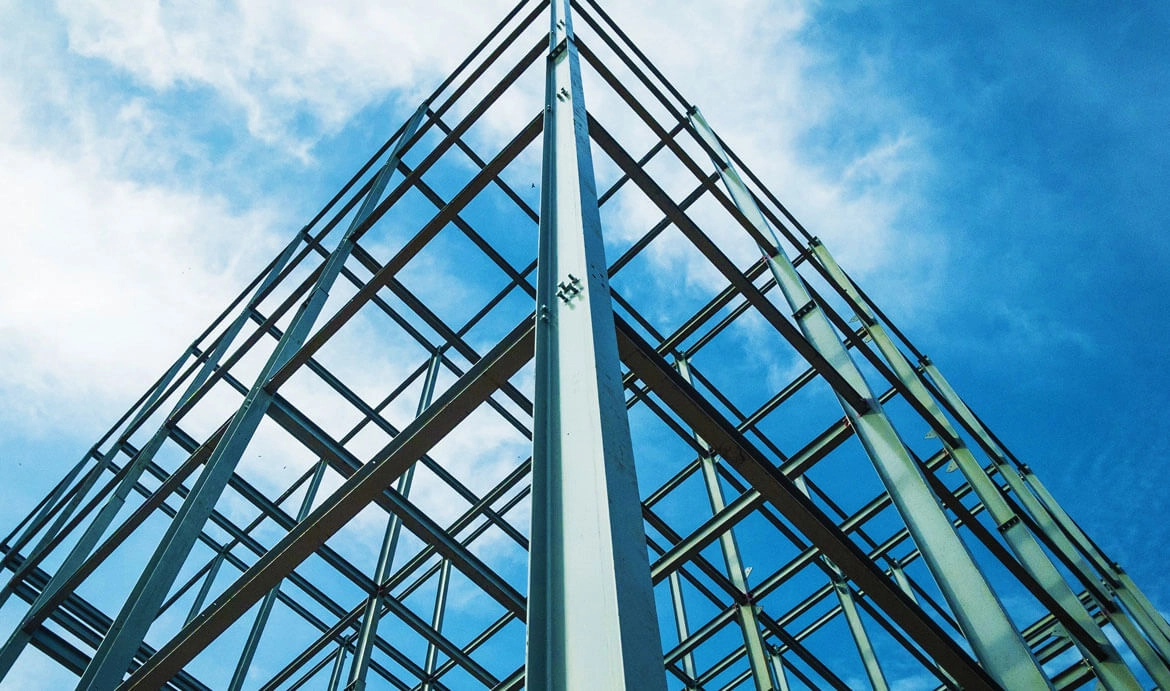- Faculty
Faculty of Engineering and Technology
- Department
Department of Civil Engineering
- Campus
Technology Campus (Peenya Campus)
- Engagement Mode
Full Time
- Study
2 Years
Overview
As per a report from Invest India, the Indian construction industry is expected to reach USD 1.4 trillion by 2025, highlighting the demand and scope of structural engineering in India. The rapid urbanisation and infrastructure development in the country are the key drivers of the demand for structural engineers who design and build new structures and assess ageing infrastructure.
MTech in Structural Engineering stands as a beacon for aspiring engineers seeking specialised knowledge in designing and analysing structures. The MTech in Structural Engineering syllabus encompasses a comprehensive blend of theoretical concepts and practical applications, equipping students with the expertise needed to address complex engineering challenges. This advanced programme is crucial for individuals aspiring to contribute to the construction and infrastructure sectors.
MTech Structural Engineering candidates delve into subjects like advanced structural analysis, earthquake-resistant design, and innovative materials, ensuring a robust foundation for tackling real-world structural complexities. With the ever-growing demand for skilled professionals in the construction industry, an M.Tech in Structural Engineering not only enhances career prospects but also plays a pivotal role in shaping the future of sustainable and resilient infrastructure globally.


Program Objectives
- Modelling, simulation, analyses, design and validation of structural components/systems.
- Modern construction technologies and materials Selection of materials, manufacturing processes and development of structural components and systems.
- Experiments on structural components/systems and evaluate their performance.
- Use of commercially available software for analysis and design.
- General perspective and opportunities for a career in structural engineering design and analysis in industry, the public sector and non-governmental organizations.
- Teamwork, lifelong learning and continuous improvement.
Programme Specific Outcomes (PSOs)
Knowledge and Understanding:
- PSO-1. Recognize and understand the major features of structural engineering with the perspective of structures’ safety and sustainability; explain working, theoretical principles and design of various structural systems
- PSO-2. Describe the factors critical in designing structures for their structural, handling and safety requirements and approach for design to meet the requirements of national and other codes
- PSO-3. Explain the design requirements for structural stability, serviceability and durability and disaster prevention in civil structural system; explain the design requirements for structures to withstand forces due to temperature, creep, cracking and imposed loads
- PSO-4. Understand research techniques including information retrieval, experimental design, theoretical derivation, and/or modelling, discuss various structural materials and systems
Cognitive Skills:
- PSO-5. Identify, design and analyse structural engineering problems and solve using a multidisciplinary approach
- PSO-6. Analyse and propose design changes essential to balance costs, buildability, safety and environmental impact and sustainability
- PSO-7. Integrate and apply professional judgements to critically evaluate different design options relevant to limitations of local, national and international standards, codes of practice and building regulations
- PSO-8. Acquire and implement broad research and analytical skills related to structural engineering and arrive at innovative structural design
Practical Skills:
- PSO-9. Create structural drawings, working drawings, 3D geometric models of different Stages of construction as per national and international standards, codes of practice
- PSO-10. Create Finite Element, CFD and static and dynamic analyses models using CAE Tools
- PSO-11. Conduct physical tests on structural materials and structural components
- PSO-12. Obtain design information relevant to the site, including carrying out of site investigation, field tests and laboratory tests for soil, wind, earthquake and/or other environmental parameters
Capability Skills / Transferrable Skills:
- PSO-13. Manage information, develop technical reports and make presentations
- PSO-14. Build, Manage and Lead a team to successfully complete a project and communicate across teams and organizations to achieve professional objectives
- PSO-15. Work under various constraints to meet project targets
- PSO-16. Adopt to the chosen profession by continuously upgrading his/her knowledge and understanding through Life-long Learning philosophy
Program Educational Objectives (PEOs)
- PEO-1. To Provide students with knowledge in mathematics, science and core engineering area to enable them to deliver efficient solutions for complex engineering problems using analytical and cognitive skills
- PEO-2. To enable students to design and develop the sustainable innovative solutions for industry and societal requirements by conducting engineering investigations through experimentation and usage of modern tools.
- PEO-3. To inculcate ethics, communication, leadership, soft, managerial and entrepreneurial skills for successful career in industries and to engage in lifelong learning
Curriculum Details
The Programme consists of four semesters as shown below. A student is required to successfully complete the following courses and earn credits for the award of the degree.
| Sl.No. | Code | Course Title | Theory (h/W/S) | Tutorials (h/W/S) | Practical (h/W/S) | Total Credits | Max. Marks |
|---|---|---|---|---|---|---|---|
| 1 | STC501A | Advanced Concrete technology and Modern Construction Techniques | 3 | -- | 2 | 4 | 100 |
| 2 | STC502A | Resource Management in Civil Construction | 3 | 1 | 2 | 5 | 100 |
| 3 | STC503A | Construction Planning and Contract Management | 3 | 1 | 2 | 5 | 100 |
| 4 | STE51XA | Refer Elective course table | 4 | -- | -- | 4 | 100 |
| 5 | STE52XA | Refer Elective course table | 4 | -- | -- | 4 | 100 |
| 6 | MEF501A | Research Methodology & IPR | 2 | -- | -- | 2 | 50 |
| 7 | TSU501A | Professional communication | 1 | -- | -- | -- | -- |
| Total | 20 | 02 | 06 | 24 | 550 | ||
| Total number of contact hours per week | 28 hours | ||||||
| Number of credits can be registered | Minimum | 19 | Maximum | 24 | |||
| Sl.No. | Code | Course Title | Theory (h/W/S) | Tutorials (h/W/S) | Practical (h/W/S) | Total Credits | Max. Marks |
|---|---|---|---|---|---|---|---|
| 1 | STC511A | Advanced Design of RCC Structures | 3 | 1 | -- | 4 | 100 |
| 2 | STC512A | Theory of Elasticity and Plasticity | 3 | 1 | -- | 4 | 100 |
| 3 | STC513A | Advanced Design of Steel Structures | 3 | 1 | -- | 4 | 100 |
| 4 | STE53XA | Refer elective course table / Online courses/ MOOC | 4 | -- | -- | 4 | 100 |
| 5 | STE54XA | Refer elective course table / Online courses/ MOOC | 4 | -- | -- | 4 | 100 |
| 6 | BAU201A | Innovation and Entrepreneurship | 1 | 1 | 2 | 3 | 100 |
| Total | 18 | 4 | 0 | 23 | 600 | ||
| Total number of contact hours per week | 22 hours | ||||||
| Number of credits can be registered | Minimum | 16 | Maximum | 23 | |||
| Sl.No. | Code | Course Title | Theory (h/W/S) | Tutorials (h/W/S) | Practical (h/W/S) | Total Credits | Max. Marks |
|---|---|---|---|---|---|---|---|
| 1 | STI521A/STP521A | Internship / Project work | -- | -- | 24 | 12 | 300 |
| Total | 0 | 0 | 24 | 12 | 300 | ||
| Total number of contact hours per week | 24 hours | ||||||
| Number of credits can be registered | Minimum | 12 | Maximum | 12 | |||
Note: In the 3rd Semester The student Can choose Either Internship or Project work
| Sl.No. | Code | Course Title | Theory (h/W/S) | Tutorials (h/W/S) | Practical (h/W/S) | Total Credits | Max. Marks |
|---|---|---|---|---|---|---|---|
| 1 | STP522A | Dissertation and Publication | -- | -- | 24 | 12 | 300 |
| Total | 0 | 0 | 24 | 12 | 300 | ||
| Total number of contact hours per week | 24 hours | ||||||
| Number of credits can be registered | Minimum | 12 | Maximum | 12 | |||
| Elective Courses List | |||
|---|---|---|---|
| Stream / Specialization | S. No. | Course Code | Course Title |
| Group-1 | E11 | STE511A | Advanced Structural Mechanics |
| E12 | STE512A | Geotechnical Earthquake Engineering | |
| E13 | STE513A | Design of Masonry, Timber Structures and Form Work | |
| E14 | STE514A | Probability and Statistics for Civil Engineers | |
| Group-2 | E21 | STE521A | Building and Allied Services Management |
| E22 | STE522A | Sustainable construction Materials and Management | |
| E23 | STE523A | Advanced Foundation Design and Machine Foundation | |
| E24 | STE524A | Advanced Structural Materials | |
| E25 | STE525A | Design of Tall Structures | |
| E26 | STE526A | Formwork and Pre-cast Structures | |
| Group-3 | E31 | STE531A | Design of RCC, PSC and Steel Bridges |
| E32 | STE532A | Reinforced Soils | |
| E33 | STE533A | Fracture Mechanics | |
| E34 | STE534A | Fire and Safety Engineering Design | |
| Group-4 | E41 | STE541A | Condition Assessment, Repair, Rehabilitation and AI |
| E42 | STE542A | Theory of Plates, Shells and Composites | |
| E43 | STE543A | Design of Offshore Structures | |
Eligibility Criteria
- B.E./B. Tech.. or equivalent in Civil Engineering, Architecture, Construction Technology. Aeronautical Engineering, Or Allied disciplines related to Civil Engineering
- Admission Selection process for the University quota will be based on RUAS AT scores, while GATE/CUET-PG scores are also accepted and RUAS AT will be exempted for these candidates.
Structure
Fee Structure 2025–26
| Course | Total Fee for 1st year |
|---|---|
| M.Tech. Structural Engineering | Rs.233,000 |
Intake
12 Seats
Career Path
- Civil Engineer
- Planning Engineer
- Project Engineer
- Construction Manager
- Structural Engineer
- Site Engineer
- Design Engineer
Contact
Start your journey with MSRUAS
Ramaiah University of Applied Sciences
Heritage Building, Gnana Gangothri Campus New BEL Road, MSR Nagar, Bengaluru-58
Contact
Phone 080 4536 6616
Mobile +91 80100 04444
